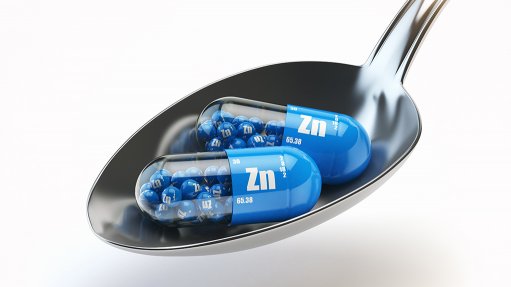
HEALTHY COMPONENT Zinc is integral to human health as it boosts the immune system, with many zinc-based medicines, including tablets
Baby bum cream, fertiliser and roof tiles all have one thing in common: the lesser-known, but incredibly pervasive mineral, zinc.
“You may vaguely recall zinc on the ingredients list of some or other product you consume, but you never gave it a second thought. Or perhaps you are fully aware of its versatility and multitude of uses. Some of its applications may well still surprise even those in the know,” says International Zinc Association Africa Desk head Simon Norton.
Overall, China produces 34% of global mined zinc ore. Norton notes that, in its June 2020 forecast for zinc prices, analysis and consultancy company Fitch Solutions sees a short-term spike in prices as steel production, particularly Chinese production, returns to normal.
This spike is expected to be followed by a slowdown in prices to an average of about $2 055/t into 2021, as currently Fitch sees a surplus of zinc of about 71 000 t, in contrast to the deficit of 189 000 t seen in 2019, Norton highlights. Fitch Solutions expects the market to remain in surplus for years to come.
Norton enthuses that this “versatile metal” has many applications. He notes that zinc, in various compounds, can be used in a of myriad ways and its uses can be traced as far back as 1000 BC.
For instance, zinc is essential to agriculture, as it significantly boosts crop productivity and is a basic requirement for healthy plant life.
Zinc is a common micronutrient deficiency in agricultural soils and zinc-based fertilisers are, therefore, essential to protect plants from environmental stresses and diseases that stunt growth, as well as promote good rooting and crop yield, Norton points out.
Further, brass – an alloy metal made of copper and zinc – has unique properties and versatility, and is “one of the most widely used alloys on the planet”, he adds.
The metal also has applications in the broader built environment sector, and is
considered environment-friendly, as it requires lower energy in its production, compared with other common building materials, and is also 100% recyclable, Norton underscores.
He notes that researchers at the University of Arkansas, in the US, have found that coating solar cells with a thin layer of zinc oxide can boost efficiency.
Other Applications
In the automotive industry, zinc’s ability to be formed into very specific parts without losing stability or strength makes it ideal for safety elements, including seatbelt components, says Norton.
Zinc is often used for exterior parts, including parts of the windscreen wiper, sunroof and chassis, owing to its corrosion resistance.
Further, he mentions that the biggest market for refined zinc worldwide is galvanising, whereby a protective coating is applied to steel to prevent corrosion.
“Hot-dip galvanising is the process of dipping fabricated steel into a kettle or vat containing molten zinc. While the steel is in the kettle, the iron in the steel metallurgically reacts with the molten zinc to form a tightly bonded alloy coating that provides superior corrosion protection for steel,” Norton explains.
This process is primarily used for construction, electrical power masts, agricultural equipment, automotive parts and roof sheeting, besides others.
The exposure of zinc paints in a corrosive atmosphere, Norton explains, results in the zinc being sacrificed instead of the underlying steel, which, consequently, then lasts for decades.
Meanwhile, zinc is also an ingredient in several beauty products.
“Perhaps its most well-known and common use in the beauty world is in natural, mineral sunscreen,” he explains.
Zinc is integral to human health and Norton stresses that it boosts the immune system, with many zinc-based cold and flu medicines, including tablets, nasal sprays, and lozenges.
Owing to its anti-inflammatory properties, zinc can help to relieve redness and irritation on the skin, and even potentially reduce scarring. It is also sometimes used to aid the treatment of depression, Norton concludes.